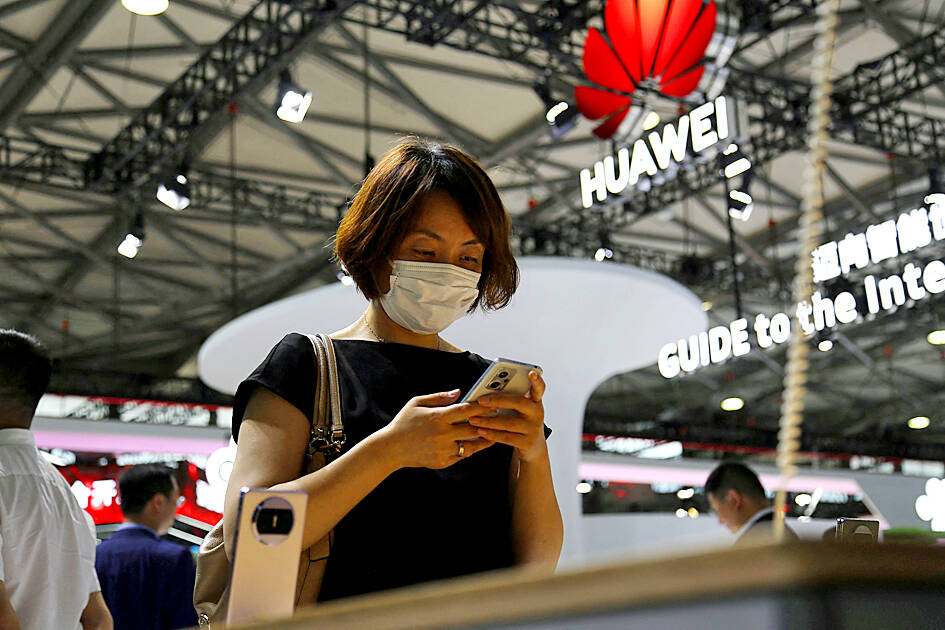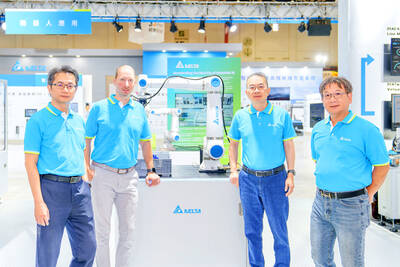The US government has begun an official probe into an advanced made-in-China chip housed within Huawei Technologies Co’s (華為) latest smartphone, a revelation that has set off a debate in Washington about the efficacy of sanctions intended to contain a geopolitical rival.
The US Department of Commerce, which has enacted a series of restrictions against Huawei and China’s chip industry over the past two years, said it is investigating into the “purported” 7-nanometer processor discovered within the Mate 60 Pro. The chip was made by China’s Semiconductor Manufacturing International Corp (SMIC, 中芯), which like Huawei is blacklisted by the US and restricted from accessing US technology.
Huawei’s quiet reveal of a mobile phone-utilizing technology the US has sought to keep out of Beijing’s hands threatens to derail recent efforts of outreach by the administration of US President Joe Biden. The phone went on sale online while US Secretary of Commerce Gina Raimondo was on a trip to China last week, the latest in a series of high-level diplomatic visits to Beijing.

Photo: Reuters
The debate now centers around whether it represents a failure of US efforts — led by Raimondo’s department — to hamstring China’s tech sector, which Washington fears would give its rival a military edge. It raised questions about whether the main US mechanisms to do that — controls on exports of key materials, tools and knowhow — need to be tightened.
Chinese semiconductor equipment makers soared 20 percent after news of the US probe spurred bets that the sector would gain increased state support. That advance was mostly led by companies related to lithography gear — a weak link in China’s chip supply chain, and one Beijing would like to develop. Shanghai Electric Group Co (上海電氣), whose controlling shareholder has a major stake in lithography specialist Shanghai Micro Electronics Equipment Group Co (上海微電子), rose by its 10 percent limit.
“We are working to obtain more information on the character and composition of the purported 7-nanometer chip,” a US Commerce spokesperson said in a statement. “To be clear: Export controls are just one tool in the US government’s toolbox to address the national security threats presented by the People’s Republic of China [PRC]. The restrictions in place since 2019 have knocked Huawei down and forced it to reinvent itself — at a substantial cost to the PRC government.”
The Mate 60 Pro smartphone employs an unusually high proportion of Chinese parts, in addition to its main processor, an ongoing analysis by TechInsights conducted for Bloomberg revealed, a sign of the country’s progress in developing domestic tech capabilities.
US National Security Advisor Jake Sullivan has said he would withhold comment until the US obtained more information.
“There’s a number of different methods to try to sort of come to an understanding of what exactly it is that we’re dealing with here,” Sullivan told reporters aboard Air Force One on Thursday. “I can’t give you an exact number of days but this is not going to be months down the road. We’re going to want to look at this carefully, consult with our partners, get a clearer sense of what we’re looking at, and then we’ll make decisions accordingly.

SETBACK: Apple’s India iPhone push has been disrupted after Foxconn recalled hundreds of Chinese engineers, amid Beijing’s attempts to curb tech transfers Apple Inc assembly partner Hon Hai Precision Industry Co (鴻海精密), also known internationally as Foxconn Technology Group (富士康科技集團), has recalled about 300 Chinese engineers from a factory in India, the latest setback for the iPhone maker’s push to rapidly expand in the country. The extraction of Chinese workers from the factory of Yuzhan Technology (India) Private Ltd, a Hon Hai component unit, in southern Tamil Nadu state, is the second such move in a few months. The company has started flying in Taiwanese engineers to replace staff leaving, people familiar with the matter said, asking not to be named, as the

The prices of gasoline and diesel at domestic fuel stations are to rise NT$0.1 and NT$0.4 per liter this week respectively, after international crude oil prices rose last week, CPC Corp, Taiwan (台灣中油) and Formosa Petrochemical Corp (台塑石化) announced yesterday. Effective today, gasoline prices at CPC and Formosa stations are to rise to NT$27.3, NT$28.8 and NT$30.8 per liter for 92, 95 and 98-octane unleaded gasoline respectively, the companies said in separate statements. The price of premium diesel is to rise to NT$26.2 per liter at CPC stations and NT$26 at Formosa pumps, they said. The announcements came after international crude oil prices

STABLE DEMAND: Delta supplies US clients in the aerospace, defense and machinery segments, and expects second-half sales to be similar to the first half Delta Electronics Inc (台達電) expects its US automation business to remain steady in the second half, with no signs of weakening client demand. With demand from US clients remaining solid, its performance in the second half is expected to be similar to that of the first half, Andy Liu (劉佳容), general manager of the company’s industrial automation business group, said on the sidelines of the Taiwan Automation Intelligence and Robot Show in Taipei on Wednesday. The company earlier reported that revenue from its automation business grew 7 percent year-on-year to NT$27.22 billion (US$889.98 million) in the first half, accounting for 11 percent

A German company is putting used electric vehicle batteries to new use by stacking them into fridge-size units that homes and businesses can use to store their excess solar and wind energy. This week, the company Voltfang — which means “catching volts” — opened its first industrial site in Aachen, Germany, near the Belgian and Dutch borders. With about 100 staff, Voltfang says it is the biggest facility of its kind in Europe in the budding sector of refurbishing lithium-ion batteries. Its CEO David Oudsandji hopes it would help Europe’s biggest economy ween itself off fossil fuels and increasingly rely on climate-friendly renewables. While